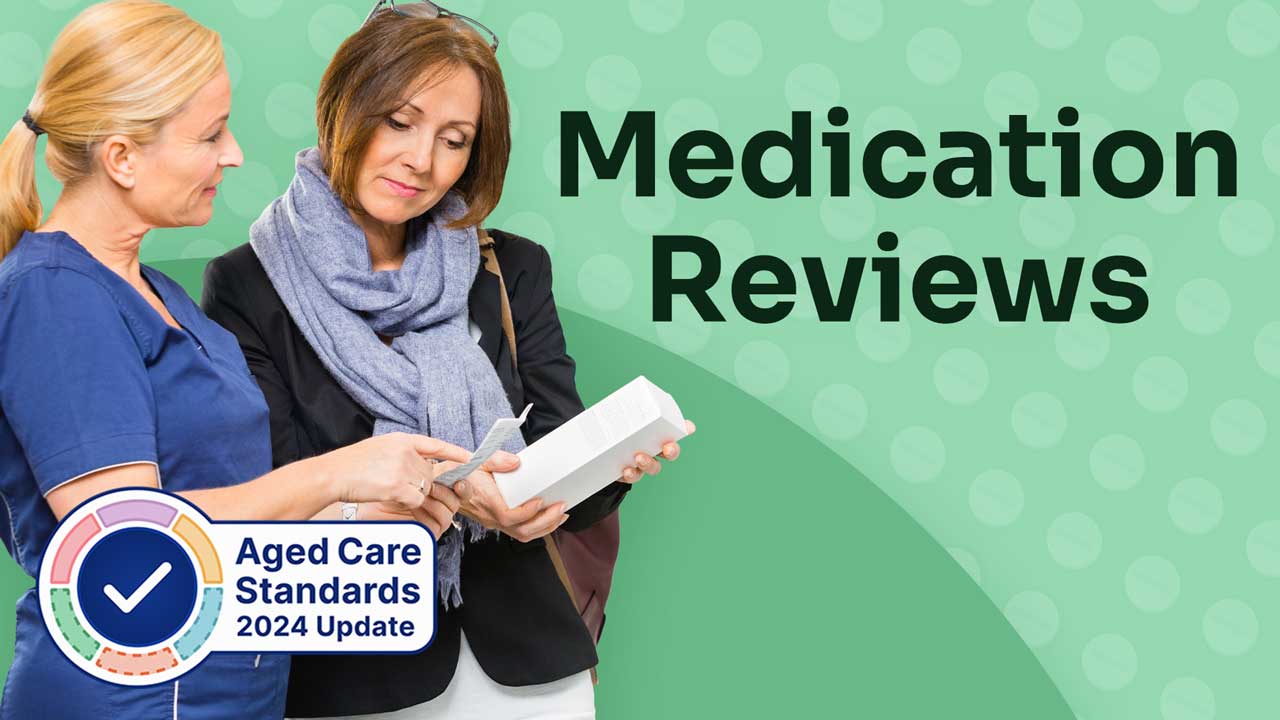Medicines are associated with more errors and adverse events than any other healthcare intervention, resulting in increased costs and reduced quality of care (SHPA 2015).
Medication reviews are integral in reducing the prevalence of adverse events and ensuring that medicines are being used safely and appropriately.
What is a Medication Review?
A medication review is a systematic evaluation of a patient’s medicines. It is an interprofessional process that aims to ensure medicines are being used safely and effectively at all times (CEC 2019).
During a medication review, a practitioner works together with the patient to assess the risks and benefits of all medicines being taken by the patient. This may lead to decisions being made about the patient’s medication regimen (PSA 2020).
The two main goals of a medication review are to:
- Facilitate the effective and quality use of medicines
- Reduce the likelihood of medicine-related issues such as adverse drug reactions (ADRs).
(CEC 2019)
Any issues or potential issues found during a medication review should be documented and addressed, and appropriate recommendations should be made to counter identified risks (CEC 2019).
Rather than solely being a pharmacist’s role, medication reviews are an interprofessional responsibility. Other members of the care team may conduct reviews when medicines are being prescribed, dispensed and administered, as long as they are appropriately trained to do so (ACSQHC 2023; CEC 2019). Ideally, a multidisciplinary collaborative approach is used.

Medication Reviews in the National Safety and Quality Health Service Standards
Medication reviews are outlined in Action 4.10 of the National Safety and Quality Health Service Standards, under Standard 4: Medication Safety Standard.
This action states that medication reviews should be conducted and documented in order to ensure medicine use is optimised and the risk of medicine-related problems is reduced (ACSQHC 2023).
Health service organisations are required to:
- Conduct medication reviews in accordance with evidence and best practice
- Prioritise reviews based on patients’ clinical needs
- Document reviews and any recommendations made.
(ACSQHC 2023)
Medication Reviews Under the Strengthened Aged Care Quality Standards
Standard 5: Clinical Care - Outcome 5.3: Safe and quality use of medicines under the strengthened Aged Care Quality Standards (Action 5.3.2) requires aged care providers to conduct medication reviews for an older person:
- At the start of care, during care transitions and annually for ongoing care
- When there is a change in diagnosis, a decline in behaviour, cognition, mental or physical condition, or when the person becomes acutely unwell
- When there is polypharmacy that can potentially be deprescribed
- When a new medicine is started, or there is a change to an existing medicine or the older person’s medication management plan
- When an adverse event potentially related to the older person’s medicines occurs.
(ACQSC 2024)
Medication Review v Medication Reconciliation
Keep in mind that medication reviews and medication reconciliation are different, but related processes. While medication reviews focus on optimising medicine use, identifying issues and implementing recommendations, medication reconciliation is more related to interprofessional communication and resolving discrepancies (CEC 2019).
Generally, medication reconciliation should be undertaken prior to a review, as this will ensure the patient’s medication history is as comprehensive as possible, allowing for a more accurate review (CEC 2019).
Who Requires a Medication Review?
There are a number of reasons why a medication review might be needed. The patient, their carers, medical practitioners, pharmacists or health professionals involved in the patient’s care are all able to indicate that a review may be necessary, but the medical practitioner is responsible for making the decision to refer (PSA 2020). In the community and in aged care facilities, funding is available for General practitioners and accredited pharmacists under the Medical Benefits Scheme (MBS).
Every organisation should have risk assessment criteria for identifying patients who require a medication review. Priority should be given to patients who are at higher risk of experiencing medicine-related problems or ADRs (ACSQHC 2023).
Patients who meet any of the following risk factors are more susceptible to medicine-related problems and adverse events, and may benefit from a medication review:
- Patients over the age of 65
- Patients who have recently experienced a medication-related issue or ADR
- Patients who are non-adherent with medicines (or suspected to be)
- Patients who are taking more than 5 medicines, or more than 12 doses of medicines per day
- Patients who have not achieved or maintained goals of medication therapy
- Patients with several medicine prescribers
- Patients who have chronic conditions that are associated with a high risk of unplanned hospital admission (e.g. COPD, heart failure)
- Patients with three or more chronic conditions
- Patients who have recently been discharged from acute care
- Patients who have frequent unplanned hospital admissions
- Patients who have had an unplanned readmission within 28 days of discharge
- Patients who have recently been admitted to residential aged care
- Patients who have had significant changes to their medication regimen within the past three months
- Patients taking medicines known to be high-risk such as opioids and psychotropic medicines
- Patients with functional issues that increase the risk of harm or decrease the likelihood of benefitting from medicines (e.g. frailty, cognitive impairment)
- Patients experiencing prescription cascade (when a medicine is prescribed to manage the adverse effects of another medicine)
- Patients who are having difficulty managing devices such as inhalers or subcutaneous injections
- Patients with a BMI greater than 35
- Patients with no regular general practitioner
- Patients who are having difficulty understanding and following their medication regimen
- Culturally or linguistically diverse patients, or patients experiencing literacy difficulties.
(PSA 2020; SHPA 2015)

What Does a Medication Review Involve?
A structured medication review should comprise:
- A review of:
- All current medicines being taken by the patient (prescribed, over-the-counter and complementary) and what they are being used for
- All past medicine-related orders and administration records
- Anaesthetic and operative records
- Ceased medicine orders
- How safe, appropriate and effective current medicines are, and whether they are being used in accordance with guidelines
- Whether the patient has experienced any ADRs or has risk factors that would predispose them to an ADR
- Any monitoring that is required
- The patient’s views, understanding, concerns, questions and problems related to their medicines.
(ACSQHC 2023; NICE 2015)
Reviewing Medicines
Each medicine currently being taken by the patient (i.e. existing or newly prescribed) needs to be assessed for clarity, validity and appropriateness (ACSQHC 2023).
The following questions should be asked:
| Clarity |
|
| Validity |
|
| Appropriateness |
|
(CEC 2019; SHPA 2013)
With these points in mind, you should also consider:
- Whether there is documented reasoning or evidence indicating the use of medicine
- Whether the patient still needs the medicine
- Whether the medicine is working
- Whether there are any risks associated with the medicine
- Any monitoring that is required, if necessary
- Whether any patient-specific issues will affect the use of the medicine.
(ACSQHC 2023)
Working With Patients

Medication reviews should be patient-centred (WA DoH 2018), taking into account the patient’s experience with the medicines they are taking (ACSQHC 2023).
The patient should be supported to participate in the review process to the extent that they choose and provide input about the options, benefits and risks of their medicines (PSA 2020).
When conducting a medication review, the patient’s satisfaction with their medicines should be assessed to determine whether they are having a positive care experience (e.g. whether they are experiencing any medicine-related problems). If the patient has a chronic condition, their quality of life and life expectancy should be considered when making decisions (ACSQHC 2023).
Discussing when, how and whether the patient has been taking their prescribed medicines will provide a greater understanding of the patient’s experience and allow any issues to be identified and addressed (ACSQHC 2023).
Conclusion
Medication reviews can help ensure that medicines are always being used safely and appropriately while reducing the risk of medicine-related problems and ADRs. They are also a useful way of gauging patient experience and satisfaction so that the patient’s medicine regimen can be tailored to better suit their needs.
All reviews and recommendations that arise should be appropriately documented, and medicines should always be prescribed, dispensed and administered in consultation with the required information and patient records.
Test Your Knowledge
Question 1 of 3
True or false: Medication reviews should include anaesthetic and operative records.
Topics
Further your knowledge
References
- Aged Care Quality and Safety Commission 2024, Standard 5: Clinical Care, Australian Government, viewed 15 May 2024, https://www.health.gov.au/resources/publications/strengthened-aged-care-quality-standards-august-2025?language=en
- Australian Commission on Safety and Quality in Health Care 2023, Action 4.10 Medication Review, Australian Government, viewed 12 October 2023, https://www.safetyandquality.gov.au/standards/national-safety-and-quality-health-service-nsqhs-standards/medication-safety-standard/continuity-medication-management/action-410
- Clinical Excellence Commission 2019, A Guide to Medication Reviews for NSW Health Services 2019, New South Wales Government, viewed 12 October 2023, http://www.cec.health.nsw.gov.au/__data/assets/pdf_file/0016/554110/A-Guide-to-Medication-Reviews-for-NSW-Health-Services-2019.PDF
- The National Institute for Health and Care Excellence 2015, Medicines Optimisation: The Safe and Effective Use of Medicines to Enable the Best Possible Outcomes, NICE, viewed 12 October 2023, https://www.nice.org.uk/guidance/ng5/resources/medicines-optimisation-the-safe-and-effective-use-of-medicines-to-enable-the-best-possible-outcomes-pdf-51041805253
- Pharmaceutical Society of Australia 2020, Guidelines for Comprehensive Medication Management Reviews, PSA, viewed 12 October 2023, https://www.ppaonline.com.au/wp-content/uploads/2020/04/PSA-Guidelines-for-Comprehensive-Medication-Management-Reviews.pdf
- The Society of Hospital Pharmacists of Australia 2013, Compiled Quick Guides SHPA, SHPA, viewed 12 October 2023, https://shpa.org.au/publicassets/c0a132c4-de53-ec11-80dd-005056be03d0/quick_guides_e-book_2013.pdf
- The Society of Hospital Pharmacists of Australia 2015, Fact Sheet: Risk Factors for Medication-related Problems, SHPA, viewed 12 October 2023, https://shpa.org.au/publicassets/7f4d5fd6-de53-ec11-80dd-005056be03d0/shpa_fact_sheet_risk_factors_for_medication_related_problems_june_2015.pdf
- Western Australia Department of Health 2018, Best Practice Principles for Medication Review: Guidance Document, Government of Western Australia, viewed 12 October 2023, https://ww2.health.wa.gov.au/~/media/Files/Corporate/Policy%20Frameworks/Clinical%20Governance%20Safety%20and%20Quality/Policy/Medication%20Review%20Policy/Supporting/Best-Practice-Principles-for-Medication-Review.pdf
Additional Resources
- Standard 5: Clinical Care
- Stronger Standards, Better Aged Care Program | ACQSC
- Action 4.10: Medication Review | ACSQHC
- A Guide to Medication Reviews for NSW Health Services 2019 | CEC
- Guidelines for Comprehensive Medication Management Reviews | PSA
- Fact Sheet: Risk Factors for Medication-related Problems | SHPA
 New
New 

